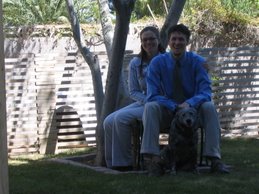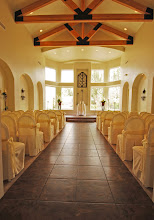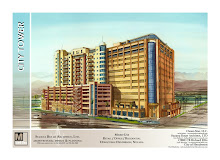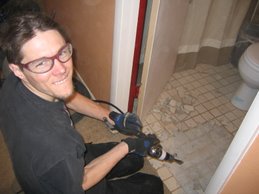Continuing on my last thought...
I said, "I really take offense that there is suggestion, strong suggestion that Architecture (the built environment) is to blame for the in-opportunities, inequality, homeless, etc..." Though I hear the comment that, "What design does is makes some actions easier and more likely and others more difficult," but where is the individual responsibility? Yes I agree that certain "built environments" are more conducive to various behaviors and perceived notions about the people that occupy those spaces. However, the behaviors/actions that were discussed in the essay can take place in almost all areas, whether it be in the Ghetto or in gated communities.
The idea that policing an area could make certain people "feel distinctly unwelcome" is odd to me. Stealing the words of the great Colin Cowherd, "that is a you problem." On the flip side of that, I agree that it is not for me or anyone else to say when someone can feel fear or be uncomfortable. But let it be clear that these are real feelings and are on both sides of the proverbial "gate."
Which is why, I guess, that families move into the gated communities with these grand illusions that this is the promised land of bliss and comfort. I have less then little compassion to those who buy into the CC&R communities and then later decide to fight their way out of a contract. Although I agree most of the power within the CC&R boards is overstated and seemingly out of control, but keep in mind it is known at the time of purchase what the rules are. Paul Garland said it best, "....and it drove me crazy. I know live 35 minutes away from downtown on a 10 acre horse farm, and yes I have a trampoline in the backyard visible from the street." Well said, well said.
Picture of greatest example of
Urban Sprawl in Las Vegas, NV
Instead of crying about fairness, freedom, the lack of privacy and the denial of diversity, make a change. Play by the rules or get out.
Boundaries are inevitable, whether planned or just hap-chance. People groups enjoy boundaries and expect them. Boundaries in many ways define people, they can be geographical, physical, mental, etc., but they still define people. I feel the major problem with boundaries comes when boundaries are placed upon groups of people by other groups.
The architecture (built environments) and the real social effect on society is a concern and should be addressed in the style, feel, materials, and scale of spaces. How people move in and out, interact with "strangers" in either a residential or commercial node, and get from "A" to "B" should be well thought out and sensitive to all that will (and will want to) use those spaces. Small movements such as downtown revitalization, a better mixture of rooftops and retail pads, and affordable housing (not apartments) is the start. Side bar... why are apartments called apartments when they are all stuck together?.. anyways....
This subject, now that it is in the forefront of all of our thoughts, can really shape the feel, experience and style of our intensive studio project.



















6 comments:
Ken, I echo alot of your sentiment...yes, the built environment can encourage and discourage certain behaviour....but, what I keep coming back to is, whether or not it can make it more or less conducive to be a good "fellow citizen," citizenship and social issues/deficiencies can no more be caused by the built environment than they can be fixed by it.....people breathe life into architecture....it can only work with what we give it......
Ken,
The best and yet funniest example I can think of regarding the land of bliss living behind the safety of the "protective gate" was when
I lived in Baton Rouge. Master P a 'gangster raper' from New Orleans bought a house and moved into the gated community of the Country Club of Lousiana. He viewed that community as a safe and secure place to live. I wonder how his neighbors felt?
Ken -
I want to give a different perspective to your comment that, "behaviors/actions that were discussed can take place in almost all areas". Yes, this is possible, but not likely. If we want to promote diversity at all levels within a community to avoid segregation and political inequality within a community, we must attract diversity.
My neighborhood fits within Brickard's description as a middle-class white enclave. I can tell you that we are all very similar in nature and backround and that our decision making processes are based on common experiences and we will make common choices. And it is this "collective common perspective" that shapes the decisions made within our environment.
If we want to change this and attract diversity we need to design with the purpose of attracting diversity. If everyting we build caters to one popint of view we are only going to attract those that agree with that point of view.
-tjs
Tim,
True, true, true... People always talk about wantiong diversity and equality. Yet people, as you just said congerate towards people that they are in line with, ie. background, nature, etc. What is wrong with that?
This brings us back to "comfor zone" and everyone has a different idea of comfort/fear.
You also said, "If we want to change this..." but the real question is do "we" as a society really truelly want to do that?
Survey says.... not really or at least only a small amount. Not to mention that I am not yet sold on catering to everyone at once and the largest factor that only one other person so far brought up. Developers make a lot of the "design" decessions before an Architect is even hired. Until all Architects are at an elevated status as say Frank Gehry, you have to do what you have to do to make a living.
"The idea that policing an area could make certain people 'feel distinctly unwelcome' is odd to me. "
Have you ever heard of "driving while black?" There's a fair bit of research showing that people of color are far more likely to be stopped by police, both as drivers and as pedestrians.
Back in the day, I lived in Amarillo, Texas (perhaps the biggest mistake of my life). I was in my early 20s and had long hair and walked everywhere -- didn't own a car -- and wore a backpack to carry things from stores to home. And I was made to feel distinctly unwelcome by the local police. This might not have even been intentional on their part (though I certainly felt then like it was); I just didn't fit the profile of who ought to be walking around town, and their antennae were up a little bit. So they'd drive by a little slower, and sometimes ask where I was from or where I was going, and why was I walking on the road next to I-40 and was I a runaway or a hitchhiker or...
One time, I was stopped by a cop while I was walking home from my restaurant job on a Friday evening (yes, I was 23 and had long hair, and yes, it was near the Interstate, and yes, I was wearing a backpack...). He was pretty aggressive about why was I out walking around, and I was probably a little aggressive back, and the next thing you know, there's two other cars and five cops and everybody's got their hands resting on their holstered sidearms. If I'd been Hispanic, or hadn't had an apartment (and a driver's license, even though I didn't have a car), I'd absolutely have been on the ground with a knee in my back. As it was, we just yelled at each other for a couple more minutes, and the one who stopped me in the first place said "leave that god damn bag home if you don't want us pullin' you over."
So I have a very faint and distant memory of being made to feel unwelcome because of my difference. If I were Black or homeless, I think those memories would be a lot sharper and more frequent. Is that a "me problem?"
Ken,
I may be naive and you can tell me if I am. But I think from one who has lived most of his life amongst conformity, when I have been able to experience divesity, it has always left me feeling exhilerated. Yes, I have had to overcome my fears to get there, but when I have, it has been memorable on a greater level than just a snapshot in a photo album. I mean you can still smell, hear, and feel what was going on around you at the time. I imagine you have those types of memories.
I think if people knew what they were missing they WOULD want to change things.
And maybe I am naive. Maybe I have been lucky to have not been "hurt" when in those exposed circumstances.
Post a Comment